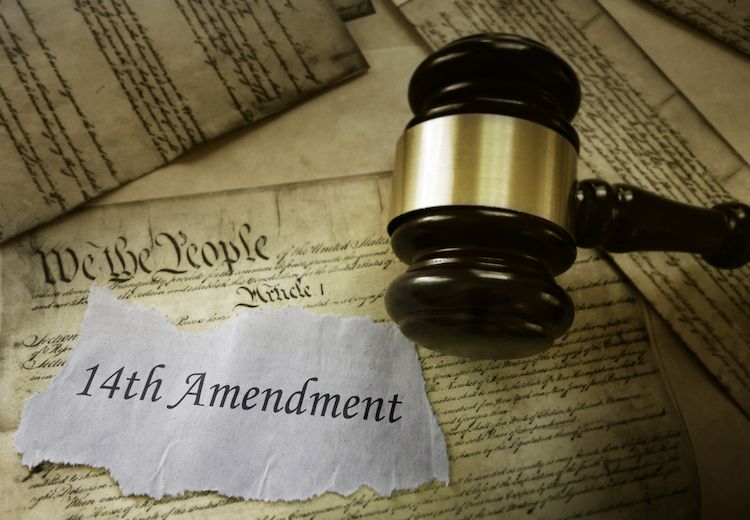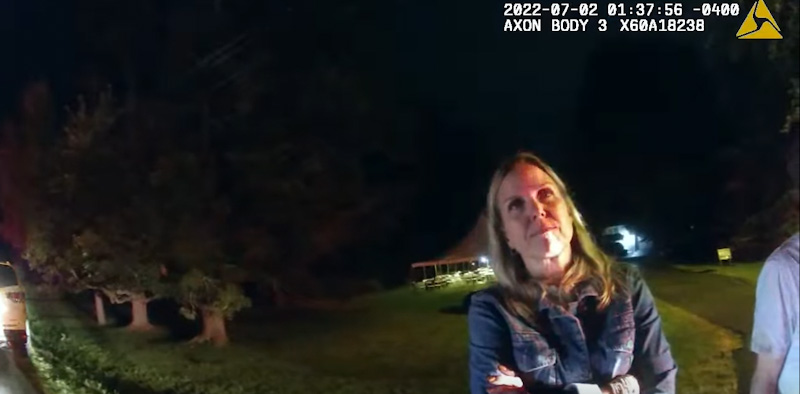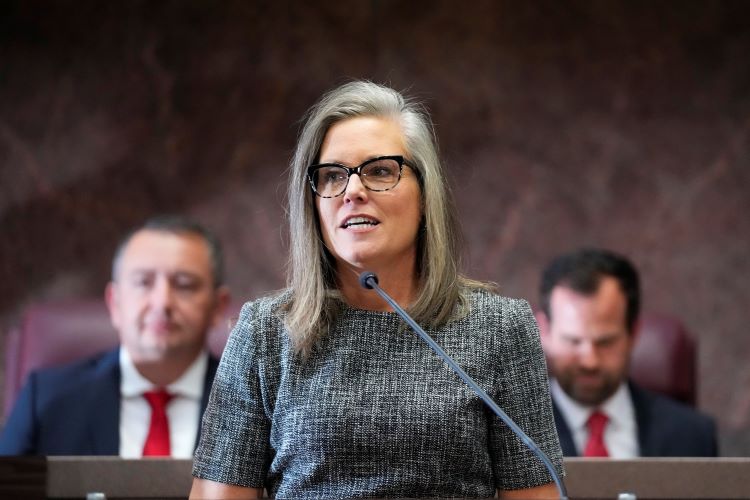Colorado Supreme Court opinion gives SCOTUS possible avenues to keep Trump on ballot
Election Law
Colorado Supreme Court opinion gives SCOTUS possible avenues to keep Trump on ballot
December 20, 2023, 11:24 am CST
The Colorado Supreme Court has stayed its 4-3 decision that keeps former President Donald Trump off the Colorado primary ballot, allowing the U.S. Supreme Court to step in. Image from Shutterstock.
The Colorado Supreme Court stayed its 4-3 decision Tuesday that keeps former President Donald Trump off the Colorado primary ballot, allowing the U.S. Supreme Court to step in.
The majority ruled that Trump is barred from ballot access under Section 3 of the 14th Amendment. The provision bars people from holding U.S. office if they engaged in insurrection or rebellion after taking an oath “to support the Constitution of the United States” as “a member of Congress or as an officer of the United States or as a member of any state legislature or as an executive or judicial officer of any state.”
The Colorado Supreme Court said Trump engaged in insurrection in the lead-up to the Jan. 6, 2021, U.S. Capitol riot. The decision is the first to block Trump from the ballot. The Trump campaign said it would appeal and noted that all the state supreme court justices are appointees of Democratic governors.
Among the publications covering the Dec. 19 opinion are the Washington Post, the New York Times, Bloomberg Law, the Wall Street Journal and Axios.
The Election Law Blog, the National Review and Original Jurisdiction consider how the Supreme Court might rule.
“I’m guessing that SCOTUS stays the Colorado Supreme Court’s ruling, sets the case for argument in February or March, and reverses, with at least one of the liberal justices joining the conservatives in ordering Trump back on the ballot,” wrote Above the Law founder David Lat at Original Jurisdiction.
Jessica Levinson, an election law professor at the Loyola Law School in Los Angeles, agreed with Lat on the outcome.
“The justices don’t want it to look like they’re taking this fundamental question away from the electorate,” Levinson told the Wall Street Journal. “The only real question is which issue will the Supreme Court reverse on.”
The Colorado Supreme Court ruled after a trial-level judge ruled that Trump did engage in insurrection, but the 14th Amendment does not apply to presidents. The judge, Judge Sarah B. Wallace of Denver, cited two reasons.
First, the amendment lists several types of office holders who have taken constitutional oaths who would be banned from office as an insurrectionist, but it does not specifically list presidents. Second, the amendment applies to office holders who have taken an oath “to support the Constitution,” wording that does not track the presidential oath to “preserve, protect and defend” the Constitution.
The Colorado Supreme Court summarized its ruling in bullet points. The reasoning includes:
• The Colorado election code permits the challenge to Trump’s status as a qualified candidate.
• Congress does not have to pass implementing legislation to make Section 3’s disqualification provisions effective.
• The political question doctrine does not bar a court from considering Trump’s eligibility under Section 3.
• Section 3 applies to the presidency.
• It was not an error for the trial judge to consider the Jan. 6, 2021, report by Congress, it was not error to conclude that the Capitol riot was an insurrection, and it was not error to conclude that Trump engaged in insurrection through his actions.
• Trump’s speech before the Capitol riot was not protected by the First Amendment.
Each of the three Colorado Supreme Court dissenters cited differing reasons why they ruled for Trump, and none matched Wallace’s reasoning.
One of the dissenters would have tossed the case because Section 3 is not self-executing, and Trump has not been charged with insurrection under a federal law that disqualifies defendants from office after a conviction. One would have dismissed the case because the state election code did not give courts authority to decide Section 3 claims. The third said the court didn’t have the authority to decide the issue without a criminal conviction under the state election code, which decides issues at a “breakneck pace” without rigorous due process procedures.
Rick Hasen a professor at the University of California at Los Angeles School of Law, noted that Trump would have to prevail on only one of the legal issues before the Supreme Court.
“So in some ways, the legal odds are with him,” Hasen wrote on the Election Law Blog.
“It is far from clear that the U.S. Supreme Court will reach the merits—there are many legal doctrines like ripeness and mootness that would give the court a way to avoid deciding the issues in the case,” Hasen wrote.
Dan McLaughlin, a senior online writer for the National Review, agreed that the Supreme Court could decide the issues without deciding whether Trump engaged in insurrection.
“Trump has a number of federal law defenses,” McLaughlin wrote at the National Review. They are: “that Section 3 isn’t self-executing without implementing legislation or a criminal conviction, that it doesn’t cover the president, that the First Amendment protects Trump’s speech and wasn’t implicitly repealed in that regard by the 14th Amendment, that the Republican Party has a First Amendment right of association to put an ineligible candidate on its primary ballot, and even that Trump may have a legal defense because the Senate didn’t convict him on effectively the same charge.”
McLaughlin thinks that the Supreme Court will have to rule before Jan. 5, which is the deadline to certify candidates for the Colorado ballot.
“Merry Christmas, John Roberts,” McLaughlin wrote. “Hope you and your colleagues didn’t have plans.”
See also:
“GOP can put Trump on primary ballot, even if he is ineligible for office, top Minnesota court rules”






